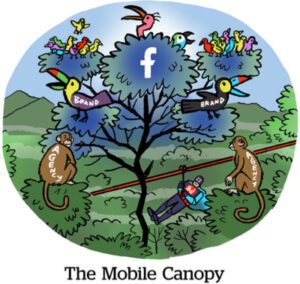Hey, Commerce readers. This is James Hercher, and we’re back from a short hiatus with the AdExchanger Commerce newsletter.
This week, we catch up with Barry Hott.
Perhaps you know him as the “Make Ugly Ads” guy on Twitter or LinkedIn. Hott was also head of growth for Ranch Water, a hard seltzer brand acquired by Diageo in 2021.
Since leaving last year, he’s been a consultant and agency co-owner with a focus on DTC brands and paid social. Now he’s taken a similar head of growth role at Rotten, a startup candy brand with an irreverent, gonzo attitude and new-age edge.
Rotten candy is low sugar and comes in compostable packaging, which depicts ’90s-era gross-out imagery of bones, bugs and body parts.
Hott’s new job allows him to be transparent and share the ad data as part of his social media publishing and consulting work, he told AdExchanger.
DTC brand operators and other commerce marketers are attracted to expertise coming from someone who can show how they made it work for themselves “with skin in the game,” Hott said.
Rotten is still in the early stages of figuring out how its message resonates with customers, he added. “But, to be honest, my constant state is figuring it out.”
AdExchanger caught up with Hott about the DTC playbook and his plans to build Rotten gummies into a major candy brand.
AdExchanger: Where are Rotten gummies for sale?
BARRY HOTT: Right now, we’re DTC. We’ll likely be on Amazon in the near future.
This week, people can start buying it wholesale. So we are already in some stores, and we’re going to be in more.
The plan is to promote the ads for DTC, but also understand that ads on Facebook won’t necessarily get everyone to click and buy an eight-pack of gummy worms immediately. There will be a large halo effect that will drive sales in store, combined with our really noticeable branding.
It’s similar to my experience with Ranch Water or a brand like Liquid Death. We ran a DTC playbook optimizing our ads based on site actions that relate to high intent.
 What is the DTC playbook?
What is the DTC playbook?
Right now, for instance, I’m super-focused on getting the messaging figured out and figuring out what makes sense for our audiences on Facebook and Instagram. That’s the key.
Then, once we have the creative somewhat dialed in and we can start to iterate more, we’ll want to explore TikTok, both from a paid and organic perspective. We’d be silly not to eventually pursue an organic play there.
And we’ll bring in some more influencer stuff as well.
As you add TikTok, Amazon, Google, etc., does that fall under your purview, or do you add people and/or services to manage each channel?
TikTok would definitely fall under my realm. I have plenty of experience running TikTok ads.
Amazon ads I’m not sure about. We haven’t gotten there yet, so I don’t know if that would be something we’d do internally or work with an agency on or another consultant.
But you can think of Amazon as a platform you don’t have to advertise on. We can just advertise on Facebook, and that can lift our Amazon sales.
Are there any other channels or ideas to explore that you’re excited about?
I’m just excited to try lots of things and make creative for different audiences.
I think the existing players in the space are not going to be nimble enough or smart enough – no offense – to do some of the things that we’re going to do.
 Such as?
Such as?
We’ve been doing some product seeding, like with a creator house that I was involved with a few weeks ago.
We’re going to be trying more avenues of creative.
Another thing I think would be fun and in line with that *wink* of the Rotten brand is to have OnlyFans creators make PG content for us to use as normal Facebook ads.
We’re trying to drive intent and drive sales on our website. We also understand that there’s a bigger brand push for people who aren’t ready to buy an eight-pack directly from an ad, but will probably buy it when they see us in a store. It’s hard to track – in fact, I’d say it’s impossible to really track – but you have to have some faith in advertising.
I’m not sure CMOs tell that to the CFO.
They don’t. But I’ve been doing this a long time, and the thing I’ve always known is you can justify spending more on Facebook ads, or on ads in general, as long as those ads are driving action.
There will be an immediate one-to-one impact: “Put in $1 and you get $X additional dollars out.” That’s going to be trackable.
But as you spend more and as people hear and think about your brand, there’s so much more value to that. It’s not talked about enough in the DTC and ecommerce marketing space, but that really does build your brand to be bigger as you spend more.
It goes far beyond what’s trackable.
This interview has been edited and condensed.











